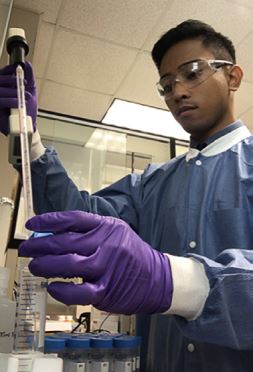AIKEN, S.C. (Sept. 9, 2019) – The Savannah River National Laboratory recently hosted 48 college students, representing 20 colleges and 16 U.S. states and territories, across seven distinct summer internship programs. The interns worked in a variety of research disciplines within SRNL, including cybersecurity, computational sciences, environmental biotechnology, nuclear measurements, and process technologies and made significant contributions to current lab projects.
The two-month internship programs culminated in August with an SRNL Intern Research Poster Session, a public event where students gained valuable experience presenting their summer’s work to SRNL leadership. Many interns also are scheduled to present their research posters at upcoming conferences in collaboration with their sponsors or to their respective academic departments.
The SRNL internship programs offer tangible benefits to both students and the organization. Interns benefit from the opportunity to participate in and contribute to significant, real-world projects in the areas of basic and applied science – specifically, the chance to be a named contributor to published or patented work.
For example, this summer, one SRNL intern participating in the DOE Office of Science’s Science Undergraduate Laboratory Internships Program will be included on a patent application due to her contributions to research on 3D printable polymers for radiological applications. In addition, the contributions of three interns participating in the Augusta University (AU) Nuclear Workforce Initiative to Environmental Science and Biotechnology Research will be included in upcoming publications and SRNL modeling systems.
“My AU students have contributed to five peer reviewed publications since 2014,” said SRNL Fellow Technical Advisor in Environmental Sciences Tim Jannick.
Patents and publications are widely accepted performance indicators in the scientific community, and these accolades will help enhance the interns’ academic pursuits and jumpstart their future professional careers.
SRNL’s Vivian Holloway, program manager of the DOE Office of Environmental Management’s Minority Serving Institutions Partnership Program (MSIPP), observed, “SRNL’s internship programs create opportunities for some of the most unique and talented next generation of scientists and engineers to gain exposure to a genuine laboratory working environment as well as first-class, world-renowned research.” The MSIPP promotes science, technology, engineering and mathematics (STEM) in higher education. This summer, SRNL hosted 10 MSIPP interns as well as 16 interns from the Savannah River Environmental Science Field Station, also funded through the MSIPP.
SRNL benefits from the internship program’s pipeline of next-generation scientists and engineers in key disciplines, many of whom choose to pursue professions at the laboratory or at other DOE sites. For example, this summer, one repeat MSIPP intern was subsequently hired as an SRNL Senior Environmental Engineer.
Dr. Jack Mayer, Manager, Environmental Sciences & Biotechnology, highlighted that hosting interns helps the lab refine the qualification requirements for its future employees. “Very often in the past, the skills that our interns have brought to the organization are skills that do not already exist among the group’s researchers,” Mayer said. “That helps us build the appropriate skills into the future workforce.”
A less tangible but equally potent benefit is the spark interns can bring to research projects. Dr. Chuck Turick, SRNL Science Fellow, Biotechnology, states, “From my experience, along with enthusiasm and youthful energy, the interns I’ve worked with bring a new set of eyes that allow us to see the projects from a different perspective.”
Finally, gratified and energized students return to their schools and homes as ambassadors for SRNL and the nuclear science community as a whole. Jannick said, “SRNL receives an investment in the future of the nuclear industry and in the success of the future workforce.”
To deliver a well-rounded development program, SRNL also provides personal-professional development, educational, and social networking opportunities, including workshops on strength finding, resume writing, interviewing skills, and work-life balance; a lecture series in partnership with the Office of Science Visiting Faculty Program; a videoconference series; luncheons and management receptions; and extracurricular events.
Internship participant feedback and retention indicates the valuable experience is felt all around. Many students have expressed interest in returning next year. As Steven Poore, a Chemical Engineering major from Clemson University, recently explained, “This summer opened my eyes to what it means to be an engineer.”
Poore continued to say, “Doing research for technology that could eventually be used in the tritium facility was an exciting experience for me. I learned a lot about processes and how to use equipment like a Residual Gas Analyzer (RGA) and “LabVIEW”, a program used to collect data from different tests. The biggest challenge I faced was the learning curve of how projects were run and my inexperience prior to this summer.”
The internship program is designed to address the exact gap Poore describes. It delivers a real world, practical and hands-on experience to prepare these students for the next steps in their careers.
Plans have been initiated for 2020 internship programs. Universities, colleges and students should visit the SRNL website for more information and to apply.

Corbin Reyes, an Environmental Science major from the University of Texas at San Antonio, working with the environmental biotechnologies group of the laboratory
###
Media contact: SRNL Media Relations